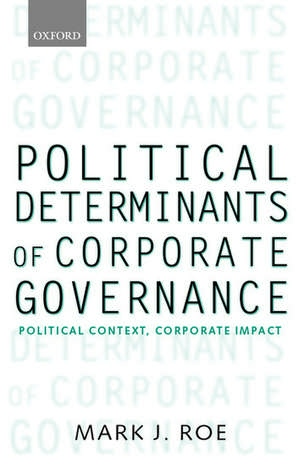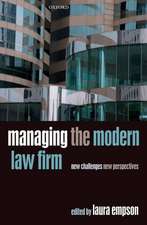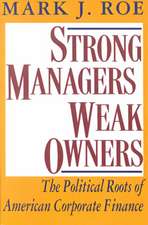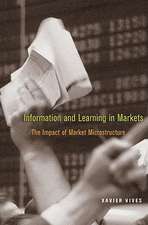Political Determinants of Corporate Governance: Political Context, Corporate Impact: Clarendon Lectures in Management Studies
Autor Mark J. Roeen Limba Engleză Paperback – 20 iul 2006
| Toate formatele și edițiile | Preț | Express |
|---|---|---|
| Paperback (1) | 343.10 lei 31-37 zile | |
| OUP OXFORD – 20 iul 2006 | 343.10 lei 31-37 zile | |
| Hardback (1) | 1007.12 lei 31-37 zile | |
| OUP OXFORD – 5 dec 2002 | 1007.12 lei 31-37 zile |
Preț: 343.10 lei
Preț vechi: 399.36 lei
-14% Nou
Puncte Express: 515
Preț estimativ în valută:
65.65€ • 68.73$ • 54.32£
65.65€ • 68.73$ • 54.32£
Carte tipărită la comandă
Livrare economică 25-31 martie
Preluare comenzi: 021 569.72.76
Specificații
ISBN-13: 9780199205301
ISBN-10: 0199205302
Pagini: 244
Ilustrații: 16 figures; 19 tables
Dimensiuni: 156 x 234 x 15 mm
Greutate: 0.4 kg
Editura: OUP OXFORD
Colecția OUP Oxford
Seria Clarendon Lectures in Management Studies
Locul publicării:Oxford, United Kingdom
ISBN-10: 0199205302
Pagini: 244
Ilustrații: 16 figures; 19 tables
Dimensiuni: 156 x 234 x 15 mm
Greutate: 0.4 kg
Editura: OUP OXFORD
Colecția OUP Oxford
Seria Clarendon Lectures in Management Studies
Locul publicării:Oxford, United Kingdom
Recenzii
Review from previous edition Review from other book by this author Strong Managers, Weak Owners does for corporate governance what Alfred Chandler's The Visiting Hand did for the corporation: makes history essential to understanding current practice and policy.
Roe has provided a powerful and original explanation of the emergence and persistence of managerial autonomy in the United States.
A seminal work that should become [a] mainstay for years to come.
I definitely recommend this book to all scholars of corporate governance and anybody else interested in the origins of corporate governance systems ... a joy to read ... Roe's book is a welcome and stimulating addition to the field.
Roe has provided a powerful and original explanation of the emergence and persistence of managerial autonomy in the United States.
A seminal work that should become [a] mainstay for years to come.
I definitely recommend this book to all scholars of corporate governance and anybody else interested in the origins of corporate governance systems ... a joy to read ... Roe's book is a welcome and stimulating addition to the field.
Notă biografică
Mark J. Roe is Berg Professor Law at the Harvard Law School. He has previously held positions at Columbia University School of Law; University of Pennsylvania School of Law; and Rutgers University School of Law. His publications include Corporate Reorganization and Bankruptcy: Legal and Financial Materials (Foundation Press, 2000) and Strong Managers, Weak Owners: The Political Roots of American Corporate Finance (Princeton University Press, 1994).









































